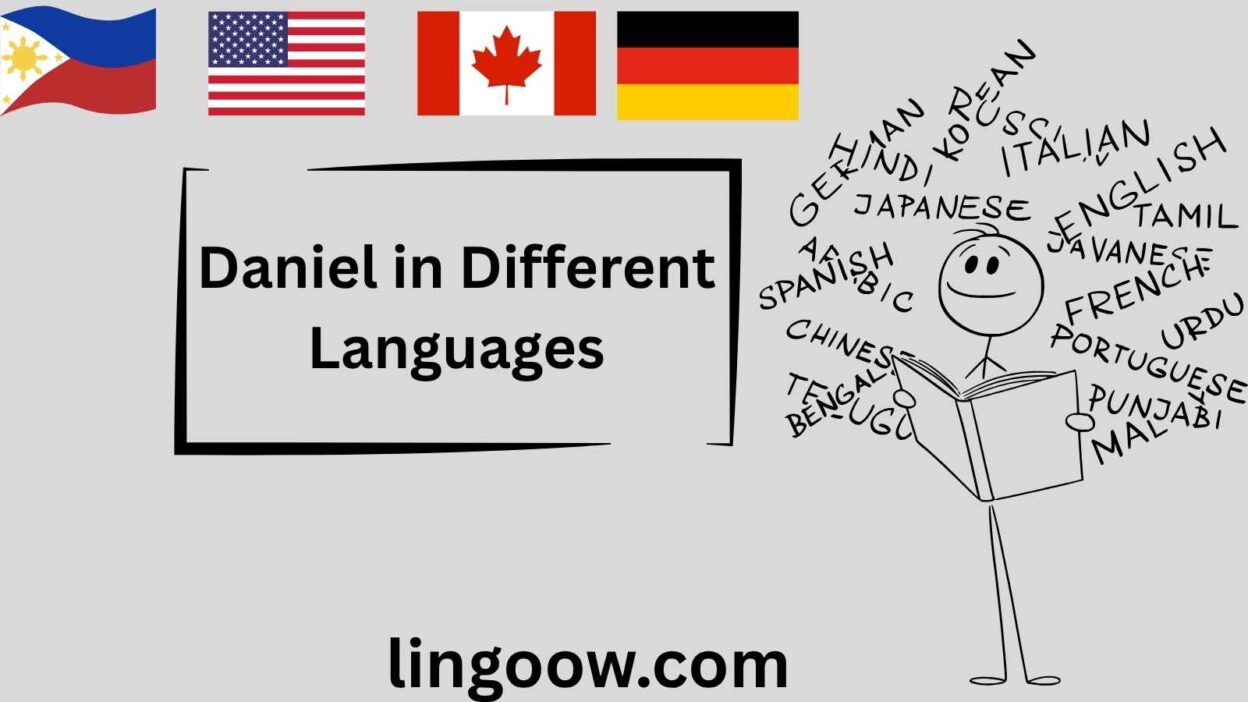Names carry stories, identities, and connections that transcend borders. I remember meeting a friend named Daniel during a trip abroad. His name sparked a conversation with locals in a small café.
in Italy, where “Daniele” rolled off their tongues with warmth and familiarity. It struck me how a single name could feel so universal yet so unique, shaped by the cadence of each language and the culture behind it.
The name Daniel, rooted in Hebrew as “God is my judge,” is a timeless thread woven into the fabric of countless societies. It’s more than a name—it’s a bridge between people, carrying history, faith, and personal meaning.
Let’s embark on a journey to explore how “Daniel” is spoken and cherished across the globe, revealing the universal theme of identity and belonging that unites us all.
A Global Reference Table for Daniel
Below is a table showcasing how the name “Daniel” is expressed in 15 languages, each with a glimpse into its cultural or linguistic significance.
| Language | Name | Cultural/Linguistic Insight |
| Hebrew | דניאל (Daniyyel) | The original form, meaning “God is my judge,” tied to the biblical prophet Daniel. |
| Spanish | Daniel | Common across Spain and Latin America, often associated with strength and wisdom. |
| French | Daniel | A classic name, pronounced with a soft “l,” symbolizing reliability in French culture. |
| Italian | Daniele | The “e” ending adds a melodic flair, often linked to artistic or intellectual figures. |
| German | Daniel | Pronounced “DAH-nee-el,” it’s a popular name reflecting dependability in German society. |
| Mandarin | 丹尼尔 (Dānní’ěr) | A phonetic translation, evoking modernity and global influence in Chinese culture. |
| Hindi | डैनियल (Dainiyal) | Adapted phonetically, it carries an exotic yet approachable charm in Indian contexts. |
| Japanese | ダニエル (Danieru) | Written in katakana, used for foreign names, symbolizing global connectivity. |
| Korean | 다니엘 (Daniyel) | A name embraced by Christians in Korea, often linked to faith and resilience. |
| Arabic | دانيال (Dānyāl) | Common in Muslim-majority countries, tied to the prophet Daniel in Islamic tradition. |
| Swahili | Daniel | Widely used in East Africa, often adopted in Christian communities for its biblical roots. |
| Zulu | Daniel | Borrowed from English, it signifies a blend of traditional and modern identities. |
| Yoruba | Daniel | Used in Nigeria, often among Christians, symbolizing divine guidance and protection. |
| Maori | Tāniera | A transliteration reflecting the Maori language’s unique phonetic structure. |
| Hawaiian | Kaniela | A softened, melodic version, embodying the warmth and community spirit of Hawaiian culture. |
European Languages: Strength and Tradition
In Europe, the name Daniel resonates with a sense of timeless reliability. In French, “Daniel” is pronounced with a gentle flow, often associated with dependable, thoughtful individuals. It’s a name you’d hear in quaint Parisian cafés or historic villages, evoking quiet strength. Spanish “Daniel” is ubiquitous across Spain and Latin America, where it’s linked to wisdom and leadership, often found in families valuing tradition. In Italian, “Daniele” carries a lyrical quality, with the extra “e” giving it a poetic edge—think of a Renaissance painter or a modern intellectual. German “Daniel,” pronounced with a crisp “DAH-nee-el,” reflects precision and dependability, a name trusted in both rural and urban settings. In Russian, “Даниил (Daniil)” has a regal tone, tied to historical figures and Orthodox Christian heritage. Across these languages, Daniel is a name that balances strength with approachability, rooted in Europe’s deep cultural and religious history.
Asian Languages: Harmony and Modernity
Asia’s linguistic diversity transforms “Daniel” into vibrant variations. In Mandarin Chinese, 丹尼尔 (Dānní’ěr) is a phonetic translation that feels modern and global, often chosen by urban families embracing international names. In Hindi, डैनियल (Dainiyal) blends seamlessly into India’s multicultural tapestry, carrying a hint of global sophistication. Japanese ダニエル (Danieru), written in katakana, reflects Japan’s openness to foreign influences, often given to those seen as cosmopolitan. In Korean, 다니엘 (Daniyel) is popular among Christian communities, symbolizing faith and resilience in a rapidly modernizing society. Arabic دانيال (Dānyāl) is widely used across at least 20 countries, from Morocco to Iraq, tied to the prophet Daniel in Islamic tradition, where it signifies divine wisdom. In countries like Persian-speaking Iran (دانیال, Dāniyāl) or Urdu-speaking Pakistan (ڈینیل, Daniel), the name carries spiritual weight, often chosen for its religious resonance. These variations highlight Asia’s ability to weave global names into local traditions, creating a harmonious blend of the universal and the unique.
African Languages: Community and Faith
In Africa, “Daniel” is a name that bridges colonial legacies and indigenous identities. In Swahili, spoken across countries like Kenya, Tanzania, and Uganda, “Daniel” is a common Christian name, reflecting biblical influence and community values. In Zulu, used in South Africa, “Daniel” is adopted as-is, symbolizing a fusion of global and local identities in post-apartheid society. Yoruba, spoken in Nigeria, embraces “Daniel” among Christian families, where it signifies divine protection—a name given with hope for a child’s future. In Amharic (Ethiopia), ዳንኤል (Daniel) is used similarly, tied to Ethiopia’s ancient Christian heritage. Across at least 20 African nations, from Ghana to Zimbabwe, “Daniel” is a name that carries spiritual weight, often chosen for its biblical roots and its ability to resonate in multilingual, multicultural communities. It’s a testament to Africa’s ability to embrace global names while infusing them with local meaning.
Indigenous & Island Languages: Spirit and Connection
In indigenous and island cultures, “Daniel” takes on unique forms that reflect deep connections to language and land. In Maori (New Zealand), “Tāniera” adapts the name to fit the language’s phonetic patterns, evoking the strength of community and ancestry. In Hawaiian, “Kaniela” has a soft, melodic quality, embodying the aloha spirit and often given to those seen as kind-hearted leaders. Cherokee (United States) uses “ᏓᏂᏱᎵ (Daniyili),” a transliteration that honors the Cherokee syllabary while maintaining the name’s essence. In Samoan, “Tanielu” carries a rhythmic flow, often associated with family and faith in Pacific Island communities. Across at least 20 indigenous and island cultures, from the Navajo Nation to Tonga, “Daniel” is adapted to reflect local phonetics and values, emphasizing the universal human need for identity and belonging within close-knit communities.
Cultural Insights: A Name Through Time
The name Daniel has deep historical roots, originating from the Hebrew “Daniyyel,” meaning “God is my judge.” Its prominence stems from the biblical prophet Daniel, whose story of faith and resilience resonated across Jewish, Christian, and Islamic traditions. In medieval Europe, the name spread through religious texts, becoming a staple in Christian societies. In the Middle East, its use in Islamic contexts tied it to stories of divine wisdom. Over time, Daniel evolved from a religious symbol to a global name, adapted to local languages while retaining its core meaning. In some cultures, like in Latin America, it’s a name of familial pride, passed down through generations. In others, like Japan, it’s a modern choice, reflecting globalization. This evolution mirrors humanity’s ability to find shared meaning in names, even as they adapt to diverse cultural lenses.
Proverbs and Sayings: Wisdom in Words
Across cultures, names like Daniel inspire proverbs and sayings that reflect its qualities. In Hebrew, a saying might be, “Like Daniel in the lion’s den, stand firm in faith,” evoking courage. In Spanish-speaking countries, you might hear, “Un Daniel siempre encuentra el camino” (A Daniel always finds the way), suggesting resourcefulness. In Arabic, a proverb like “Dānyāl’s wisdom lights the path” ties the name to divine insight. In Swahili, “Daniel ana nguvu ya imani” (Daniel has the strength of faith) is a common sentiment in Christian communities. These expressions, though varied, highlight the universal admiration for the qualities Daniel represents—wisdom, resilience, and faith.
FAQs: Exploring the Name Daniel
Why does Daniel sound similar in many languages?
The name’s biblical origins and widespread use in religious texts have led to its adoption across cultures, often with minimal phonetic changes to preserve its essence.
What is the oldest known usage of Daniel?
The name traces back to the Hebrew Bible (circa 6th century BCE), with the prophet Daniel as its most famous bearer, influencing its spread across Jewish, Christian, and Islamic traditions.
How do cultural differences affect the use of Daniel?
In Western cultures, Daniel is often a standalone name, symbolizing reliability. In Asian cultures, it may be paired with other names or used to signify modernity. In African and indigenous cultures, it often carries spiritual or communal significance, reflecting local values.
Conclusion: A Name That Unites Us
The name Daniel, in all its global variations, is a testament to the power of names to connect us across time and space. From the lyrical Daniele in Italy to the soulful Kaniela in Hawaii, each version carries a piece of its culture’s heart. Yet, at its core, Daniel speaks to a universal truth: our shared desire for identity, meaning, and belonging. Whether it’s tied to faith, family, or resilience, this name resonates with a quiet strength that transcends borders. I invite you to share your own experiences with the name Daniel—or its equivalent in your language—in the comments below. How has this name shaped your story or your culture? Let’s celebrate the beauty of our shared humanity through the stories we carry in our names.

I’m Aurora Hale, a passionate and professional author dedicated to exploring the beauty and power of language. Through my work, I aim to inspire readers, spark curiosity, and make learning both engaging and meaningful. As the founder of Lingoow.com, I’ve created a platform where language enthusiasts can discover innovative ways to communicate, learn, and connect with the world. Every story I write and every lesson I share reflects my commitment to creativity, clarity, and the transformative magic of words. Join me on this journey at Lingoow.com to unlock your linguistic potential and embrace the joy of language.




